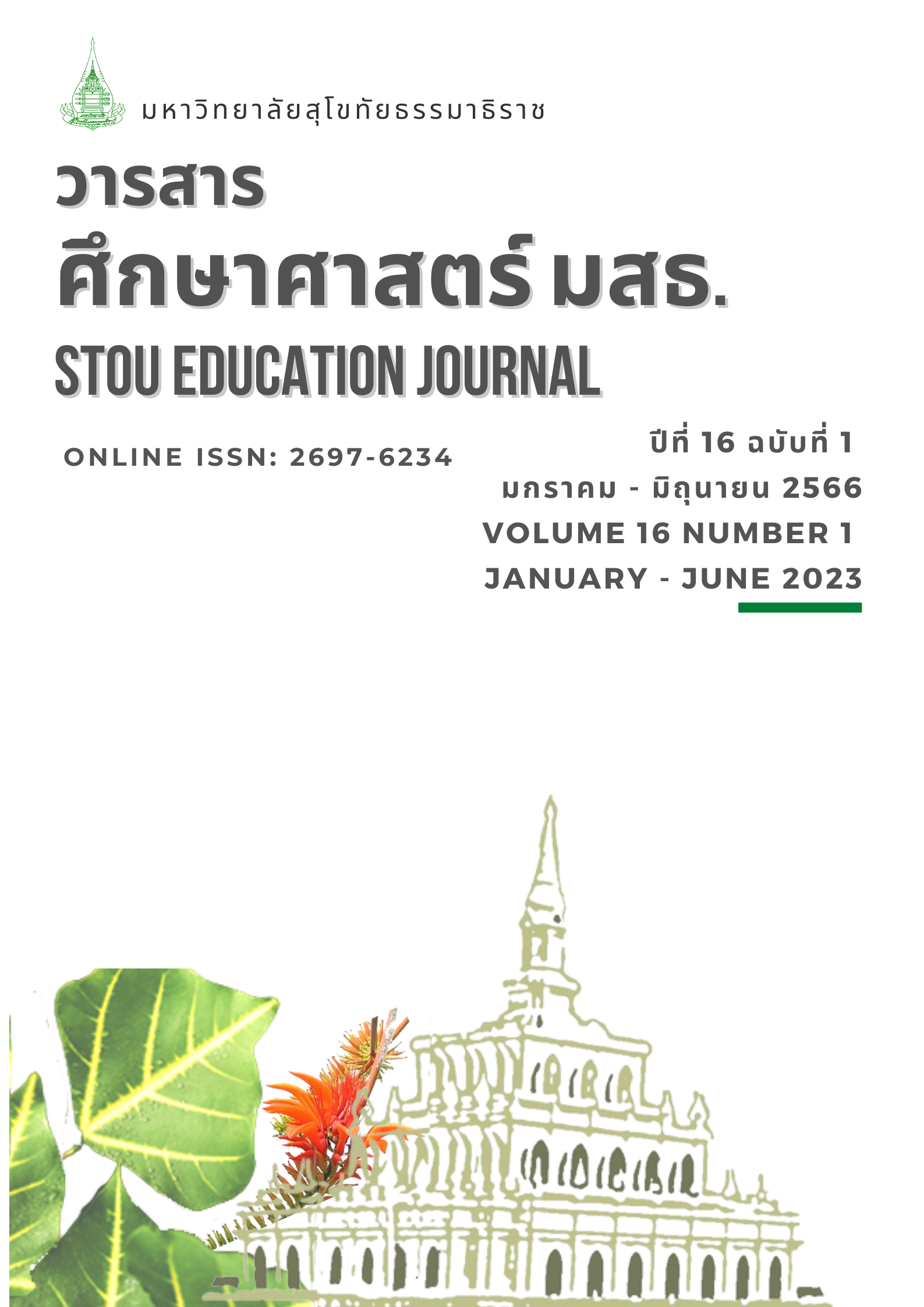การศึกษาระดับทักษะเชิงพฤติกรรมและแบบจำลองความสัมพันธ์เชิงสาเหตุของปัจจัยที่มีอิทธิพลต่อผลสัมฤทธิ์ทางการเรียนวิทยาศาสตร์ของนักเรียนระดับชั้นประถมศึกษาตอนปลาย
Main Article Content
บทคัดย่อ
งานวิจัยนี้มีวัตถุประสงค์เพื่อสำรวจระดับทักษะเชิงพฤติกรรมของนักเรียนชั้นประถมศึกษาตอนปลาย และทดสอบแบบจำลองความสัมพันธ์เชิงสาเหตุของทักษะเชิงพฤติกรรมที่มีอิทธิพลต่อผลสัมฤทธิ์ทางการเรียนวิทยาศาสตร์ของนักเรียน กลุ่มตัวอย่าง คือ นักเรียนระดับประถมศึกษาตอนปลาย จำนวน 139 คน จาก 25 โรงเรียนในจังหวัดพระนครศรีอยุธยา ที่ได้มาจากวิธีการสุ่มตัวอย่างแบบหลายขั้นตอน เครื่องมือที่ใช้ในการวิจัย คือ แบบสอบถามทักษะเชิงพฤติกรรมในห้องเรียนวิทยาศาสตร์ของนักเรียนชั้นประถมศึกษาตอนปลายที่ผ่านการตรวจสอบคุณภาพจากผู้เชี่ยวชาญจำนวน 5 คน และมีค่าความเชื่อมั่นเท่ากับ 0.94 วิเคราะห์ข้อมูลโดยการหาค่าเฉลี่ย ส่วนเบี่ยงเบนมาตรฐาน และการวิเคราะห์เส้นทาง งานวิจัยให้ข้อค้นพบที่น่าสนใจ คือ โดยภาพรวมนักเรียนระดับชั้นประถมศึกษาตอนปลายมีทักษะเชิงพฤติกรรมทั้งสามมิติ ได้แก่ ความเพียร การควบคุมตนเอง และทักษะทางสังคม อยู่ในระดับปานกลาง การวิเคราะห์เส้นทางโดยใช้โปรแกรม LISREL พบว่า ค่าไค-สแควร์ () = 0.10 ค่า p = 0.75 ค่า CFI = 1.00 ค่า GFI = 0.990 ค่า AGFI = 0.903 ค่า RMSEA = 0.000 และค่า SRMR = 0.007 ปัจจัยเชิงสาเหตุทุกตัว มีความสัมพันธ์เชิงบวกต่อผลสัมฤทธิ์ทางการเรียนวิทยาศาสตร์อย่างมีนัยสำคัญทางสถิติที่ระดับ .001 โดยมีค่าสัมประสิทธิ์สหสัมพันธ์อยู่ระหว่าง 0.64 – 0.80 และแบบจำลองความสัมพันธ์เชิงสาเหตุมีความสอดคล้องกับข้อมูลเชิงประจักษ์ โดยงานวิจัยชี้ว่าการควบคุมตนเองเป็นปัจจัยเชิงสาเหตุที่สำคัญเพราะมีอิทธิพลทางตรงเชิงบวกต่อความเพียร ทักษะทางสังคม และผลสัมฤทธิ์ทางการเรียนวิทยาศาสตร์ ปัจจัยเชิงสาเหตุทั้งสามปัจจัยสามารถร่วมกันอธิบายผลสัมฤทธิ์ทางการเรียนวิทยาศาสตร์ได้ร้อยละ 71 ข้อค้นพบของงานวิจัยนี้ให้กรอบแนวคิดแก่ครูวิทยาศาสตร์และนักวิทยาศาสตร์ศึกษาในการออกแบบประสบการณ์การเรียนรู้วิทยาศาสตร์ที่ช่วยสนับสนุนการพัฒนาผู้เรียนแบบองค์รวม
Article Details
เอกสารอ้างอิง
กระทรวงศึกษาธิการ. (2551). หลักสูตรแกนกลางการศึกษาขั้นพื้นฐาน พุทธศักราช 2551. โรงพิมพ์ชุมนุมสหกรณ์การเกษตรแห่งประเทศไทย.
จิตรัตนาภรณ์ เวียงพล, พระครูวิจิตร ปัญญาภรณ์, และ จิราภรณ์ ผันสว่าง. (2560). การศึกษาคุณลักษณะอันพึงประสงค์ของนักเรียน เครือข่ายเมืองเชียงขวัญ สังกัดสำนักงานเขตพื้นที่การศึกษาประถมศึกษาร้อยเอ็ด เขต 1. วารสารมหาวิทยาลัยมหามกุฏราชวิทยาลัย วิทยาเขตร้อยเอ็ด, 7(1), 12-23.
นที ศิริจรรยาพงษ์, นงนุช โรจนเลิส, และ อุรปรีย์ เกิดในมงคล. (2561). พฤติกรรมความมุ่งมั่นในการทำงานของนักเรียนระดับชั้นมัธยมศึกษาตอนต้น อำเภอนครชัยศรี จังหวัดนครปฐม สังกัดสำนักงานเขตพื้นที่ การศึกษามัธยมศึกษาเขต 9. วารสารสังคมศาสตร์บูรณาการ, 5(1), 132-157.
บุญชม ศรีสะอาด. (2545). การวิจัยเบื้องต้น (พิมพ์ครั้งที่ 6). สุวีริยาสาส์น.
พิริยะ ผลพิรุฬ. (2558). ครุเศรษฐศาสตร์ (รายงานผลการวิจัย). สถาบันบัณฑิตพัฒนบริหารศาสตร์.
ภัทรภร พิกุลขวัญ, โนริยูกิ อิโน๊ะอูเอะ, และ จีระวรรณ เกษสิงห์. (2565). เป้าหมายการเรียนวิทยาศาสตร์และวิธีการพัฒนาทักษะเชิงพฤติกรรมในชั้นเรียนวิทยาศาสตร์: ทัศนะของครูระดับประถมศึกษาตอนปลาย, วารสารศึกษาศาสตร์ มสธ., 15(1), 100-114.
ราชบัณฑิตยสถาน. (2564). พจนานุกรมศัพท์ศึกษาศาสตร์ ฉบับราชบัณฑิตยสถาน (พิมพ์ครั้งที่ 2). ธนาเพรส.
รุ่งฤดี กล้าหาญ, ดวงเดือน ศาสตรภัทร, และ สายสมร เฉลยกิตติ. (2559). การพัฒนารูปแบบการวัดและประเมินพฤติกรรมเพื่อเสริมสร้างคุณลักษณะอันพึงประสงค์ของนักเรียนชั้นประถมศึกษาตอนปลายของไทยในศตวรรษที่ 21. วารสารพยาบาลทหารบก, 17(2), 21-33.
อรุณศิริ จันทร์หล่น และ ภมรพรรณ์ ยุระยาตร์. (2560). การพัฒนาแนวทางคุณลักษณะอันพึงประสงค์ของผู้เรียนสำหรับสถานศึกษา สังกัดสำนักงานเขตพื้นที่การศึกษาประถมศึกษาอุดรธานีเขต 1. วารสารศึกษาศาสตร์ มหาวิทยาลัยมหาสารคาม, 11(3), 185-194.
Acar, O. (2018). Investigation of the science achievement models for low and high achieving schools and gender differences in Turkey, Journal of Research in Science Teaching, 56(5), 1-27.
Anastasi., A. (1969). Psychological testing. McMillan.
Baumeister, R. F., Vohs, K. D., & Tice, D. M. (2007). The strength model of self-control. Current Directions in Psychological Science, 16(6), 351-355.
Bowles, S., & Gintis, H. (1976). Schooling in capitalist America: Educational reform and the contradictions of economic life. Basic Books.
Durlak, J. A., Weissberg, R. P., Dymnicki, A. B., Taylor, R. D., & Schellinger, K. B. (2011). The impact of enhancing students' social and emotional learning: A meta-analysis of school-based universal interventions. Child development, 82(1), 405–432. https://doi.org/10.1111/j.1467-8624.2010.01564.x
Duckworth, A. L., & Quinn, P. D. (2009). Development and validation of the short grit scale (grit–s). Journal of Personality Assessment, 91(2), 166–174.
Farrington, C. A., Roderick, M., Allensworth, E., Nagaoka, J., Keyes, T. S., Johnson, D. W., & Beechum, N. O. (2012). Teaching adolescents to become learners, The role of noncognitive factors in shaping school performance: A critical literature review. University of Chicago Consortium on Chicago School Research.
Gabrieli, C., Ansel, D., & Krachman, S. (2015). Ready to be counted: The research case for education policy action on non-cognitive skills. https://goo.gl/7e8Kkg
Gresham, F. M., & Elliott, S. N. (2008). Social skills improvement system rating scales. MN: NCS Pearson.
_________________________. (2011). Test review. Journal of Psychoeducational Assessment, 29(3), 292 –296.
Gutman, L. M., & Schoon, I., (2013). The impact of non-cognitive skills on outcomes for young people. Institute of Education University of London.
Hair, J. F., Black, W. C., Babin, B. J., & Anderson, R. E. (2010). Multivariate Data Analysis. (7th ed.). Prentice Hall.
Heckman, J. J., Stixrud J., & Urzua, S. (2006). The effects of cognitive and non-cognitive abilities on labor market outcomes and social behavior. Journal of Labor Economics, 24(3), 411–482. doi:10.3386/w12006
Kautz, T., Heckman, J. J., Diris, R., Weel, B. T., & Borghansi, L. (2014). Fostering and measuring skills: Improving cognitive and non-cognitive skills to promote lifetime success. OECD Education Working Papers, No. 110, OECD Publishing. https://doi.org/10.1787/5jxsr7vr78f7-en.
Ma, Y., Ma, C., & Lan, X. (2020). Uncovering the moderating role of grit and gender in the association between teacher autonomy support and social competence among Chinese undergraduate students. International Journal of Environmental Research and Public Health, 17(17), 1-17.
National Research Council. (2012). Education for life and work: Developing transferable knowledge and skills in the 21st century. The National Academies Press.
Park, D., Tsukayama, E., Goodwin, G. P., Patrick, S., & Duckworth, A. L. (2017). A tripartite taxonomy of character: Evidence for intrapersonal, interpersonal, and intellectual competencies in children. Contemporary Educational Psychology, 48, 16-27.
Tangney J. P., Baumeister R. F., & Boone A. L. (2004). High self-control predicts good adjustment, less pathology, better grades, and interpersonal success. Journal of Personality, 72(2), 271-324.
Zhou, K. (2017). Non-cognitive skills: Potential candidates for global measurement. European Journal of Education, 52(4), 487-497.


